 Tìm kiếm
Tìm kiếm
Chương II Luật Căn cước công dân 2014 : Cơ sở dữ liệu quốc gia về dân cư, cơ sở dữ liệu căn cước công dân
| Số hiệu: | 59/2014/QH13 | Loại văn bản: | Luật |
| Nơi ban hành: | Quốc hội | Người ký: | Nguyễn Sinh Hùng |
| Ngày ban hành: | 20/11/2014 | Ngày hiệu lực: | 01/01/2016 |
| Ngày công báo: | 29/12/2014 | Số công báo: | Từ số 1165 đến số 1166 |
| Lĩnh vực: | Quyền dân sự | Tình trạng: |
Hết hiệu lực
01/07/2024 |
TÓM TẮT VĂN BẢN
Thẻ căn cước sẽ thay thế chứng minh nhân dân
Đây là quy định quan trọng trong Luật Căn cước công dân được Quốc Hội thông qua vào ngày 20/11/2014.
Theo đó, Công dân Việt Nam từ đủ 14 tuổi được cấp thẻ Căn cước công dân và số thẻ Căn cước công dân là số định danh cá nhân.
Thẻ Căn cước công dân là giấy tờ tùy thân của công dân Việt Nam có giá trị chứng minh về căn cước công dân của người được cấp thẻ để thực hiện các giao dịch trên lãnh thổ Việt Nam.
Thẻ Căn cước công dân phải được đổi 3 lần, khi công dân đủ 25 tuổi, đủ 40 tuổi và đủ 60 tuổi.
Chứng minh nhân dân đã được cấp trước ngày 01/01/2016 vẫn có giá trị sử dụng đến hết thời hạn theo quy định; khi công dân có yêu cầu thì được đổi sang thẻ Căn cước công dân.
Các loại giấy tờ có giá trị pháp lý đã phát hành có sử dụng thông tin từ Chứng minh nhân dân vẫn nguyên hiệu lực pháp luật.
Luật có hiệu lực từ ngày 01/01/2016.
Văn bản tiếng việt
Văn bản tiếng anh
1. Cơ sở dữ liệu quốc gia về dân cư được quản lý tập trung, thống nhất và xây dựng theo tiêu chuẩn, quy chuẩn kỹ thuật công nghệ thông tin, định mức kinh tế - kỹ thuật.
2. Bảo đảm an toàn, thuận tiện cho việc thu thập, cập nhật, khai thác, sử dụng.
3. Bảo đảm kết nối với các cơ sở dữ liệu chuyên ngành.
4. Bảo đảm quyền khai thác thông tin của cơ quan, tổ chức, cá nhân theo quy định của pháp luật.
1. Nội dung thông tin được thu thập, cập nhật gồm:
a) Họ, chữ đệm và tên khai sinh;
b) Ngày, tháng, năm sinh;
c) Giới tính;
d) Nơi đăng ký khai sinh;
đ) Quê quán;
e) Dân tộc;
g) Tôn giáo;
h) Quốc tịch;
i) Tình trạng hôn nhân;
k) Nơi thường trú;
l) Nơi ở hiện tại;
m) Nhóm máu, khi công dân yêu cầu cập nhật và xuất trình bản kết luận về xét nghiệm xác định nhóm máu của người đó;
n) Họ, chữ đệm và tên, số định danh cá nhân hoặc số Chứng minh nhân dân, quốc tịch của cha, mẹ, vợ, chồng hoặc người đại diện hợp pháp;
o) Họ, chữ đệm và tên, số định danh cá nhân hoặc số Chứng minh nhân dân của chủ hộ, quan hệ với chủ hộ;
p) Ngày, tháng, năm chết hoặc mất tích.
2. Thông tin của công dân được thu thập, cập nhật vào Cơ sở dữ liệu quốc gia về dân cư từ tàng thư và Cơ sở dữ liệu căn cước công dân, Cơ sở dữ liệu về cư trú, Cơ sở dữ liệu hộ tịch và cơ sở dữ liệu chuyên ngành khác qua việc xử lý chuẩn hóa dữ liệu sẵn có về dân cư.
Trường hợp thông tin, tài liệu quy định tại khoản 1 Điều này chưa có hoặc chưa đầy đủ thì được thu thập, cập nhật từ công dân.
1. Cơ sở dữ liệu quốc gia về dân cư là tài sản quốc gia, được Nhà nước bảo vệ theo quy định của pháp luật về bảo vệ công trình quan trọng liên quan đến an ninh quốc gia.
Cơ sở dữ liệu quốc gia về dân cư là cơ sở dữ liệu dùng chung, do Bộ Công an quản lý.
2. Khai thác thông tin trong Cơ sở dữ liệu quốc gia về dân cư được thực hiện như sau:
a) Cơ quan quản lý cơ sở dữ liệu chuyên ngành, cơ quan nhà nước, tổ chức chính trị, tổ chức chính trị - xã hội được khai thác thông tin trong Cơ sở dữ liệu quốc gia về dân cư thuộc phạm vi chức năng, nhiệm vụ, quyền hạn của mình;
b) Công dân được khai thác thông tin của mình trong Cơ sở dữ liệu quốc gia về dân cư;
c) Tổ chức và cá nhân không thuộc quy định tại điểm a và điểm b khoản này có nhu cầu khai thác thông tin trong Cơ sở dữ liệu quốc gia về dân cư phải được sự đồng ý của cơ quan quản lý Cơ sở dữ liệu quốc gia về dân cư theo quy định của pháp luật.
3. Thông tin trong Cơ sở dữ liệu quốc gia về dân cư là căn cứ để cơ quan, tổ chức kiểm tra, thống nhất thông tin về công dân. Khi công dân đã sử dụng thẻ Căn cước công dân của mình, cơ quan, tổ chức không được yêu cầu công dân xuất trình giấy tờ hoặc cung cấp thông tin đã có trong Cơ sở dữ liệu quốc gia về dân cư.
4. Chính phủ quy định chi tiết Điều này.
1. Các cơ sở dữ liệu chuyên ngành được kết nối với Cơ sở dữ liệu quốc gia về dân cư để cập nhật, chia sẻ, khai thác, sử dụng thông tin về công dân quy định tại khoản 1 Điều 9 của Luật này.
2. Thông tin về công dân quy định tại khoản 1 Điều 9 của Luật này có trong cơ sở dữ liệu chuyên ngành phải được cập nhật kịp thời, đầy đủ, chính xác vào Cơ sở dữ liệu quốc gia về dân cư.
3. Trường hợp thông tin về công dân trong các cơ sở dữ liệu chuyên ngành hoặc giấy tờ đã cấp không phù hợp với thông tin trong Cơ sở dữ liệu quốc gia về dân cư thì phải theo Cơ sở dữ liệu quốc gia về dân cư.
4. Việc kết nối, cập nhật, chia sẻ, khai thác, sử dụng thông tin giữa Cơ sở dữ liệu quốc gia về dân cư và các cơ sở dữ liệu chuyên ngành của các cơ quan, tổ chức phải bảo đảm hiệu quả, an toàn, phù hợp với chức năng, nhiệm vụ, quyền hạn theo quy định của Luật này và pháp luật có liên quan.
5. Chính phủ quy định việc kết nối, cập nhật, chia sẻ, khai thác, chỉnh sửa, sử dụng thông tin, lộ trình kết nối giữa Cơ sở dữ liệu quốc gia về dân cư và cơ sở dữ liệu chuyên ngành.
1. Số định danh cá nhân được xác lập từ Cơ sở dữ liệu quốc gia về dân cư dùng để kết nối, cập nhật, chia sẻ, khai thác thông tin của công dân trong Cơ sở dữ liệu quốc gia về dân cư và các cơ sở dữ liệu chuyên ngành.
2. Số định danh cá nhân do Bộ Công an thống nhất quản lý trên toàn quốc và cấp cho mỗi công dân Việt Nam, không lặp lại ở người khác.
3. Chính phủ quy định cấu trúc số định danh cá nhân; trình tự, thủ tục cấp số định danh cá nhân.
1. Cơ quan, tổ chức, cá nhân có trách nhiệm sau đây:
a) Tuân thủ quy trình thu thập, cung cấp và cập nhật thông tin, tài liệu vào Cơ sở dữ liệu quốc gia về dân cư;
b) Bảo đảm việc thu thập, cung cấp và cập nhật thông tin, tài liệu đầy đủ, chính xác, kịp thời;
c) Cập nhật, thông báo kịp thời thông tin về công dân khi có sự thay đổi hoặc chưa chính xác.
2. Người được giao nhiệm vụ thu thập, cập nhật thông tin, tài liệu có trách nhiệm sau đây:
a) Kiểm tra thông tin, tài liệu về công dân; thường xuyên theo dõi, cập nhật thông tin;
b) Giữ gìn, bảo mật thông tin, tài liệu có liên quan; không được sửa chữa, tẩy xoá hoặc làm hư hỏng tài liệu và phải chịu trách nhiệm về tính chính xác, đầy đủ của thông tin đã cập nhật.
3. Thủ trưởng cơ quan quản lý Cơ sở dữ liệu quốc gia về dân cư có trách nhiệm sau đây:
a) Tổ chức quản lý việc cập nhật, lưu trữ thông tin, tài liệu vào cơ sở dữ liệu;
b) Kiểm tra, chịu trách nhiệm về thông tin, tài liệu đã được cập nhật, lưu trữ vào Cơ sở dữ liệu quốc gia về dân cư.
1. Cơ sở dữ liệu căn cước công dân được xây dựng và quản lý tại cơ quan quản lý căn cước công dân Bộ Công an, Công an tỉnh, thành phố trực thuộc trung ương và Công an huyện, quận, thị xã, thành phố thuộc tỉnh và đơn vị hành chính tương đương.
2. Cơ sở dữ liệu căn cước công dân được xây dựng bảo đảm kết nối với Cơ sở dữ liệu quốc gia về dân cư, đáp ứng chuẩn về cơ sở dữ liệu và tiêu chuẩn, quy chuẩn kỹ thuật công nghệ thông tin.
3. Tuân thủ các quy định, chế độ công tác hồ sơ và giao dịch điện tử, công nghệ thông tin.
4. Thu thập, cập nhật thông tin đầy đủ, chính xác, kịp thời; bảo đảm hoạt động ổn định, an toàn và bảo mật.
1. Nội dung thông tin được thu thập, cập nhật gồm:
a) Thông tin quy định tại khoản 1 Điều 9 của Luật này;
b) Ảnh chân dung;
c) Đặc điểm nhân dạng;
d) Vân tay;
đ) Họ, tên gọi khác;
e) Số, ngày, tháng, năm và nơi cấp Chứng minh nhân dân;
g) Nghề nghiệp, trừ quân nhân tại ngũ;
h) Trình độ học vấn;
i) Ngày, tháng, năm công dân thông báo mất Chứng minh nhân dân hoặc thẻ Căn cước công dân.
2. Trường hợp thông tin quy định tại khoản 1 Điều này chưa có hoặc không đầy đủ trong Cơ sở dữ liệu quốc gia về dân cư, cơ sở dữ liệu, tàng thư căn cước công dân, Cơ sở dữ liệu về cư trú thì công dân bổ sung khi làm thủ tục cấp, đổi, cấp lại thẻ Căn cước công dân.
1. Cơ quan, tổ chức, cá nhân có trách nhiệm sau đây:
a) Chấp hành đúng quy định về việc cung cấp thông tin, tài liệu cho Cơ sở dữ liệu căn cước công dân;
b) Cung cấp đầy đủ, chính xác, kịp thời thông tin, tài liệu theo quy định của Luật này;
c) Thông báo kịp thời thông tin, tài liệu về căn cước khi có sự thay đổi hoặc chưa chính xác.
2. Người làm công tác quản lý căn cước công dân, Cơ sở dữ liệu căn cước công dân có trách nhiệm thực hiện quy định tại Điều 13 của Luật này.
1. Cơ quan, tổ chức, cá nhân trong phạm vi nhiệm vụ, quyền hạn của mình được cung cấp, trao đổi thông tin, tài liệu với Cơ sở dữ liệu căn cước công dân.
Việc truy nhập Cơ sở dữ liệu căn cước công dân hoặc nghiên cứu hồ sơ, tài liệu trong tàng thư căn cước công dân phải được sự phê duyệt của thủ trưởng cơ quan quản lý căn cước công dân.
2. Bộ trưởng Bộ Công an quy định việc cung cấp, trao đổi thông tin, tài liệu từ Cơ sở dữ liệu căn cước công dân cho các cơ quan, tổ chức, cá nhân.
THE NATIONAL POPULATION DATABASE AND CITIZEN IDENTIFICATION DATABASE
Section 1. THE NATIONAL POPULATION DATABASE
Article 8. Requirements for establishment of the national population database
1. The national population database shall be managed in a centralized and unified manner and established up to standards and technical regulations on information technology and economic-technical norms.
2. Assurance of safety and convenience for the collection, update, exploitation and use of information.
3. Assurance of connection to specialized databases.
4. Assurance of the right of agencies, organizations and individuals to exploit information in accordance with law.
Article 9. Citizen’s information to be collected and updated in the national population database
1. Information to be collected and updated includes:
a/ Family name, middle name and first name;
b/ Birthdate;
c/ Gender;
d/ Place of birth registration;
dd/ Native place;
e/ Ethnicity;
g/ Religion;
h/ Nationality;
i/ Marital status;
k/ Place of permanent residence;
l/ Present place of residence;
m/ Blood type, when a citizen requests the update of his/her blood type and produces a certificate of his/her blood type;
n/ Family name, middle name and first name, personal identification number or people’s identity card number, and nationality of parent, spouse or lawful representative of a citizen;
o/ Family name, middle name and first name, personal identification number or people’s identity card number of the householder, and a citizen’s relationship with the householder;
p/ Date of death or missing.
2. Citizen’s information shall be collected and updated in the national population database from citizen identification archives and the citizen identification database, residence database, civil status database and other specialized databases through standardization of available population data.
In case information and documents specified in Clause 1 of this Article are not yet available or are insufficient, they shall be collected from citizens and updated.
Article 10. Management, exploitation and use of the national population database
1. The national population database is a national asset which shall be protected by the State in accordance with the law on protection of important works related to national security.
The national population database is a database for common use and shall be managed by the Ministry of Public Security.
2. The exploitation of information in the national population database is provided as follows:
a/ Specialized database management agencies, state agencies, political organizations and socio-political organizations may exploit information in the national population database within the ambit of their functions, tasks and powers;
b/ Citizens may exploit their personal information in the national population database;
c/ Organization and individuals not defined at Points a and b of this Clause that wish to exploit information in the national population database may do so after obtaining the consent of the national population database management agency in accordance with law.
3. Information in the national population database serves as a basis for agencies and organizations to check and reach agreement on citizen’s information. When citizens use their citizen identity cards, agencies and organizations may not request them to produce other papers or to provide information already available in the national population database.
4. The Government shall detail this Article.
Article 11. Relation between the national population database and specialized databases
1. Specialized databases shall be connected to the national population database in order to update, share, exploit and use citizen’s information specified in Clause 1, Article 9 of this Law.
2. Citizen’s information specified in Clause 1, Article 9 of this Law which is available in specialized databases must be promptly, fully and accurately updated in the national population database.
3. In case citizen’s information in specialized databases or granted papers is inconsistent with information in the national population database, the latter must be used.
4. The connection, update, sharing, exploitation and use of information between the national population database and specialized databases of agencies and organizations must ensure efficiency, safety and compliance with their functions, tasks and powers in accordance with this Law and other relevant laws.
5. The Government shall stipulate the connection, update, sharing, exploitation, modification and use of information, and a roadmap for connection between the national population database and specialized databases.
Article 12. Personal identification numbers
1. A personal identification number shall be established from the national population database and used for the connection, update, sharing and exploitation of citizen’s information in the national population database and specialized databases.
2. Personal identification numbers shall be uniformly managed nationwide by the Ministry of Public Security; each Vietnamese citizen shall be granted with one number which is not identical to another’s number.
3. The Government shall stipulate the structure of a personal identification number; and the order and procedures for grant of personal identification numbers.
Article 13. Responsibilities of agencies, organizations and individuals in collection, provision and update of information and documents in the national population database
1. Agencies, organizations and individuals shall:
a/ Comply with the process of collection, provision and update of information and documents in the national population database;
b/ Ensure sufficient, accurate and prompt collection, provision and update of information and documents;
c/ Promptly update and inform citizen’s information upon occurrence of any change or inaccuracy.
2. Persons assigned to collect and update information and documents shall:
a/ Check information and documents on citizens; and regularly monitor and update information;
b/ Preserve and keep relevant information and documents confidential; refrain from altering, erasing or damaging documents, and take responsibility for the accuracy and sufficiency of updated information.
3. The head of the national population database management agency shall:
a/ Manage the update and storage of information and documents in the database;
b/ Check, and take responsibility for, information and documents already updated and stored in the national population database.
Section 2. THE CITIZEN IDENTIFICATION DATABASE
Article 14. Requirements for establishment and management of the citizen identification database
1. The citizen identification database shall be established and managed in citizen identification management agencies of the Ministry of Public Security, Public Security Departments of provinces or centrally run cities and Public Security Divisions of rural districts, urban districts, towns or provincial cities and equivalent administrative units.
2. The citizen identification database shall be established ensuring connection to the national population database and satisfying database standards as well as standards and technical regulations on information technology.
3. To comply with regulations and regimes on dossiers, e-transactions and information technology.
4. To fully, accurately and promptly collect and update information; to ensure stable operation, safety and security.
Article 15. Information in the citizen identification database
1. Information to be collected and updated includes:
a/ Information specified in Clause 1, Article 9 of this Law;
b/ Portrait picture;
c/ Characteristics for identification;
d/ Fingerprints;
dd/ Other family names and first names;
e/ Number, and date and place of issuance, of people’s identity card;
g/ Occupation, except in-service army men;
h/ Educational level;
i/ Date on which a citizen notifies the loss of his/her people’s identity card or citizen identity card.
2. In case the information specified in Clause 1 of this Article is not yet available or is insufficient in the national population database, the citizen identification database and archives and residence database, citizens shall supplement information upon carrying out procedures for the grant, renewal or re-grant of citizen identity cards.
Article 16. Responsibilities of agencies, organization and individuals in the collection, provision and update of information and documents in the citizen identification database
1. Agencies, organizations and individuals shall:
a/ Strictly comply with regulations on provision of information and documents for the citizen identification database;
b/ Provide information and documents in a sufficient, accurate and prompt manner in accordance with this Law;
c/ Promptly notify information and documents on identification upon occuưence of any change or inaccuracy.
2. Persons managing citizen identification and the citizen identification database shall comply with Article 13 of this Law.
Article 17. Exploitation, provision, exchange and use of citizen identification data
1. Agencies, organizations and individuals may, within the ambit of their tasks and powers, provide and exchange information and documents for/with the citizen identification database.
The access to the citizen identification database or study of dossiers and documents in the citizen identification archives must be approved by heads of citizen identification management agencies.
2. The Minister of Public Security shall stipulate the provision and exchange of information and documents from the citizen identification database for agencies, organizations and individuals.
Văn bản liên quan
Cập nhật
Điều 73. Chế độ báo cáo hoạt động đầu tư ở nước ngoài
Mục 1. CƠ SỞ DỮ LIỆU QUỐC GIA VỀ DÂN CƯ
Mục 2. CƠ SỞ DỮ LIỆU CĂN CƯỚC CÔNG DÂN
Mục 2. CẤP, ĐỔI, CẤP LẠI, THU HỒI, TẠM GIỮ THẺ CĂN CƯỚC CÔNG DÂN
Điều 22. Trình tự, thủ tục cấp thẻ Căn cước công dân
Điều 24. Trình tự, thủ tục đổi, cấp lại thẻ Căn cước công dân
Bài viết liên quan
Trẻ em dưới 6 tuổi có bắt buộc làm Thẻ căn cước không mới nhất 2025?

Trẻ em dưới 6 tuổi có bắt buộc làm Thẻ căn cước không mới nhất 2025?
Với mục tiêu xây dựng một hệ thống quản lý dân cư hiện đại, việc cấp thẻ căn cước công dân cho trẻ em dưới 6 tuổi đã được triển khai. Tuy nhiên, không phải ai cũng hiểu rõ về quy định này. Bài viết sẽ cung cấp những thông tin chi tiết về thủ tục, điều kiện và lợi ích khi làm thẻ căn cước cho trẻ nhỏ. 07/12/2024Trẻ em dưới 6 tuổi làm căn cước cần cung cấp những thông tin gì mới nhất 2025?

Trẻ em dưới 6 tuổi làm căn cước cần cung cấp những thông tin gì mới nhất 2025?
Từ ngày 01/07/2024, việc cấp thẻ căn cước công dân cho trẻ em dưới 6 tuổi đã được triển khai rộng rãi. Tuy nhiên, nhiều phụ huynh vẫn còn băn khoăn về những thông tin cần thiết để hoàn tất thủ tục này. Bài viết này sẽ giúp bạn hiểu rõ hơn về quy trình và những giấy tờ cần chuẩn bị khi làm thẻ căn cước cho con nhỏ. 07/12/2024Trên 70 tuổi có cần làm Căn cước công dân không mới nhất 2025?
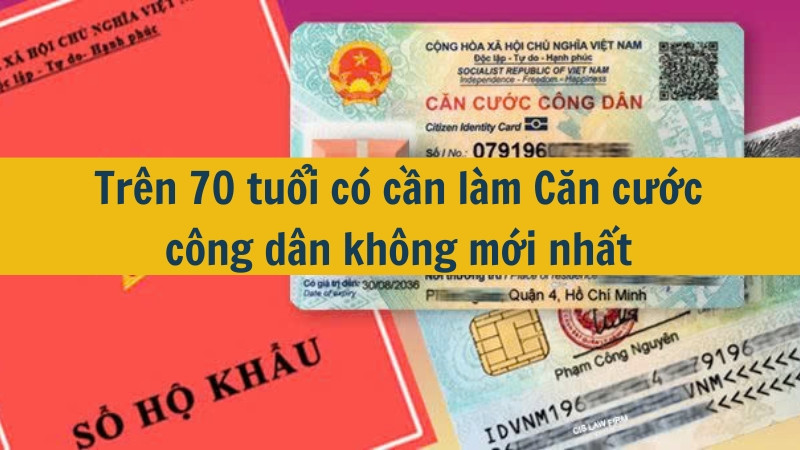
Trên 70 tuổi có cần làm Căn cước công dân không mới nhất 2025?
Việc đổi thẻ căn cước công dân là một quy định bắt buộc đối với mọi công dân Việt Nam. Tuy nhiên, nhiều người cao tuổi, đặc biệt là những người trên 70 tuổi, vẫn còn băn khoăn liệu họ có cần phải thực hiện thủ tục này hay không, nhất là trong bối cảnh những quy định về căn cước công dân liên tục được cập nhật. Bài viết này sẽ giải đáp thắc mắc trên, giúp bạn đọc hiểu rõ hơn về quy định mới nhất liên quan đến việc đổi thẻ căn cước công dân đối với người cao tuổi. 07/12/2024Người trên 80 tuổi có phải làm Căn cước công dân không mới nhất 2025?
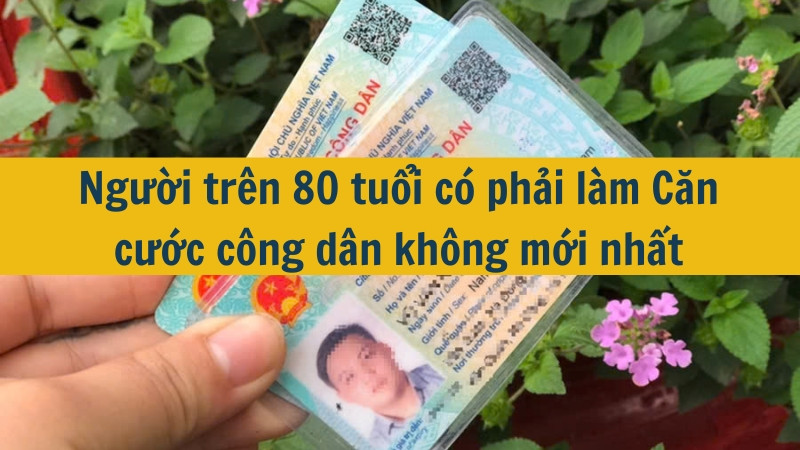
Người trên 80 tuổi có phải làm Căn cước công dân không mới nhất 2025?
Nhiều người cao tuổi, đặc biệt là những người trên 80 tuổi, đang thắc mắc liệu có cần phải làm lại căn cước công dân trong năm 2025 hay không? Với những thay đổi liên tục của quy định về căn cước công dân, việc nắm rõ thông tin chính xác là vô cùng quan trọng. 07/12/2024Trên 60 tuổi có phải làm Căn cước công dân không mới nhất 2025?
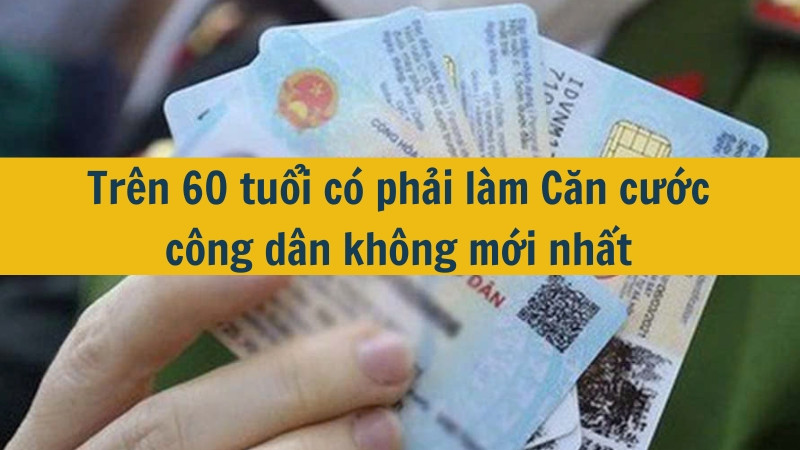
Trên 60 tuổi có phải làm Căn cước công dân không mới nhất 2025?
Nhiều người dân đang băn khoăn liệu người trên 60 tuổi có cần phải làm lại căn cước công dân trong năm 2025 hay không? Bài viết này sẽ giải đáp thắc mắc đó, cung cấp thông tin chính xác và cập nhật nhất về quy định đổi căn cước công dân cho mọi đối tượng. 07/12/202424 tuổi làm Căn cước công dân thì 25 tuổi có phải làm lại không mới nhất 2025?
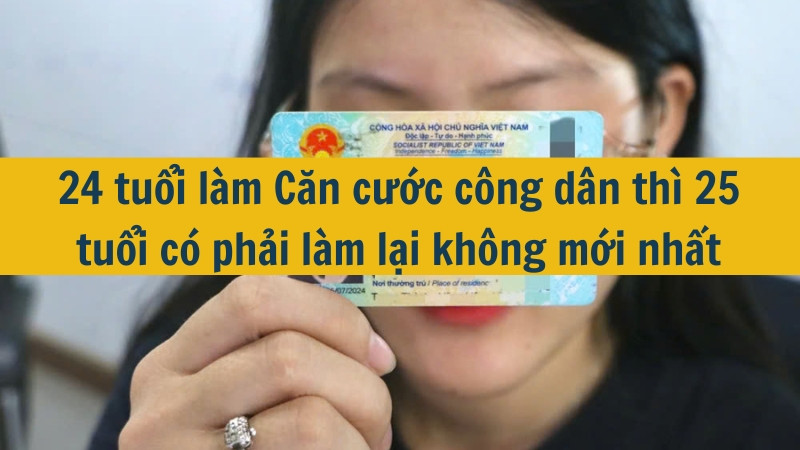
24 tuổi làm Căn cước công dân thì 25 tuổi có phải làm lại không mới nhất 2025?
Bạn đã làm thẻ căn cước công dân khi 24 tuổi và giờ đã 25? Bạn đang phân vân liệu có cần phải đổi lại thẻ hay không? Với những thay đổi liên tục của quy định về căn cước công dân, việc nắm rõ thông tin chính xác là vô cùng quan trọng. Bài viết này sẽ giúp bạn giải đáp thắc mắc này và cung cấp những thông tin cần thiết để bạn có thể yên tâm về vấn đề giấy tờ tùy thân của mình. 07/12/2024Mới làm Căn cước công dân gắn chíp năm 37 tuổi đến năm 40 tuổi có phải đổi lại Căn cước công dân gắn chip nữa không mới nhất 2025?
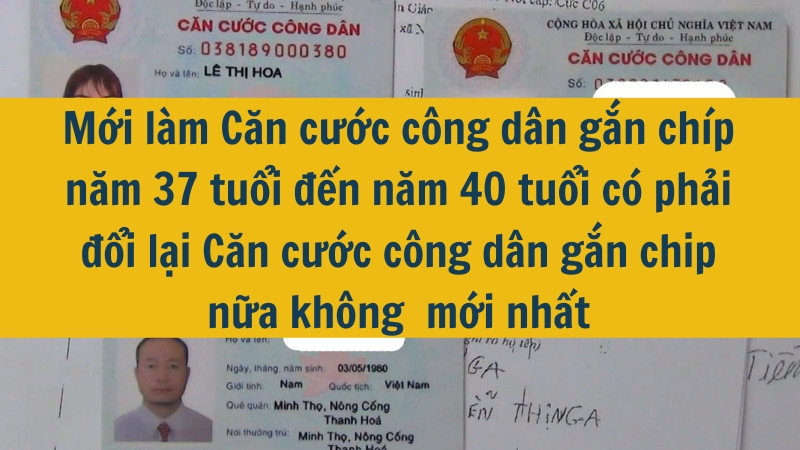
Mới làm Căn cước công dân gắn chíp năm 37 tuổi đến năm 40 tuổi có phải đổi lại Căn cước công dân gắn chip nữa không mới nhất 2025?
Thẻ căn cước công dân gắn chip không chỉ là một loại giấy tờ tùy thân mà còn là một công cụ quan trọng để thực hiện các giao dịch hành chính, pháp lý. Việc nắm rõ quy định về việc đổi thẻ sẽ giúp bạn tránh những rắc rối không đáng có trong quá trình thực hiện các thủ tục hành chính. Bài viết này sẽ cung cấp cho bạn những thông tin chính xác và cập nhật nhất về vấn đề này. 07/12/2024Bao nhiêu tuổi làm Căn cước công dân mới nhất 2025?

Bao nhiêu tuổi làm Căn cước công dân mới nhất 2025?
Thẻ căn cước công dân là một loại giấy tờ tùy thân vô cùng quan trọng đối với mỗi công dân Việt Nam. Với những thay đổi liên tục của luật pháp, nhiều người dân đang băn khoăn về độ tuổi quy định để làm hoặc đổi thẻ căn cước. Bài viết này sẽ giải đáp thắc mắc. "Bao nhiêu tuổi làm Căn cước công dân mới nhất 2025?" và cung cấp những thông tin cần thiết để bạn nắm rõ quy định hiện hành. 07/12/2024Căn cước công dân sai quê quán thì phải làm sao mới nhất 2025?
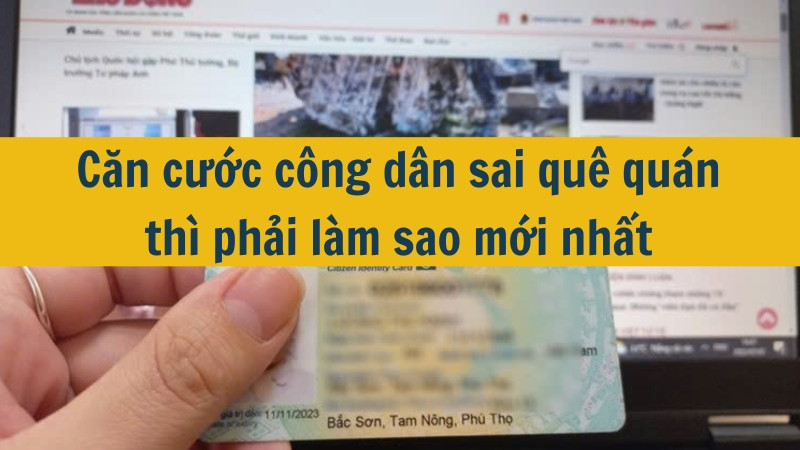
Căn cước công dân sai quê quán thì phải làm sao mới nhất 2025?
Căn cước công dân là giấy tờ tùy thân quan trọng, nhưng không phải lúc nào thông tin trên thẻ cũng hoàn toàn chính xác. Nếu bạn phát hiện quê quán trên CCCD của mình sai, bạn sẽ làm gì? Bài viết này sẽ giúp bạn giải đáp câu hỏi đó. 06/12/2024Căn cước công dân sai địa chỉ thường trú thì phải làm thế nào mới nhất 2025?
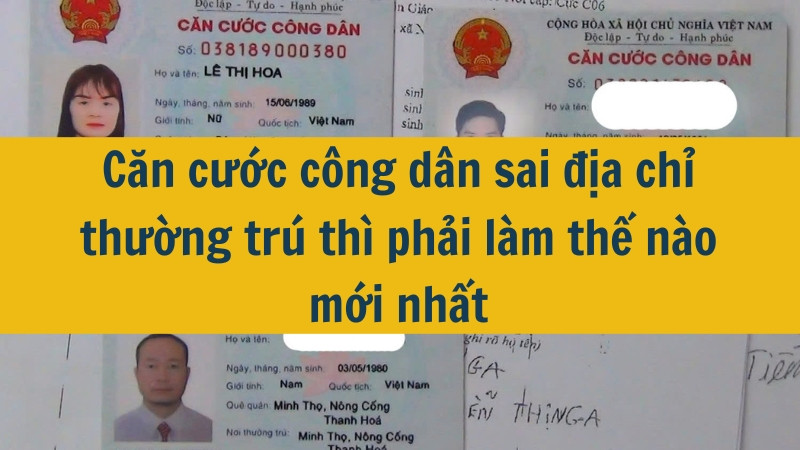

 Luật Căn cước công dân 2014 (Bản Word)
Luật Căn cước công dân 2014 (Bản Word)
 Luật Căn cước công dân 2014 (Bản Pdf)
Luật Căn cước công dân 2014 (Bản Pdf)